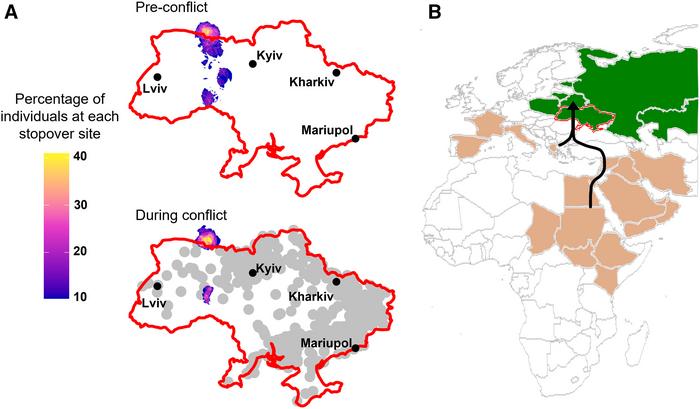When migrating through Ukraine in 2022, Greater Spotted Eagles were exposed to multiple conflict events that altered their migratory course, according to a study reported on May 20 in the journal Current Biology. Greater Spotted Eagles are large raptors that are classified as a vulnerable species by the International Union for Conservation of Nature (IUCN).

Credit: Current Biology/Russell et al.
When migrating through Ukraine in 2022, Greater Spotted Eagles were exposed to multiple conflict events that altered their migratory course, according to a study reported on May 20 in the journal Current Biology. Greater Spotted Eagles are large raptors that are classified as a vulnerable species by the International Union for Conservation of Nature (IUCN).
“Armed conflicts can have wide-ranging impacts on the environment, including changes in animal behavior,” says Charlie Russell (@CJG_Russell) of the University of East Anglia, UK. “Our study provides the first quantitative evidence of this, showing how migrating eagles made deviations to avoid conflict events and spent less time refueling at stopover sites. It also indicates that there are potentially many human activities, beyond wars, that likely change or impact animal behavior.”
Researchers from The Estonian University of Life Sciences University, British Trust for Ornithology (BTO), and their in-country partners started tagging Greater Spotted Eagles that were breeding in Belarusian Polesia in 2017. Although the eagles are no longer found in most of Europe, Polesia remains a stronghold for the species. The goal was to track the raptors and identify important areas that the species relies on to inform future conservation efforts.
Then, on February 24, 2022, the Russian Federation invaded Ukraine. On March 3, the first of 21 tagged Greater Spotted Eagles crossed into Ukraine on their usual migration. By that time, the conflict had spread from Kyiv and eastern regions to most major cities.
“We did not expect to be following these birds as they migrated through an active conflict zone,” Russell says.
While they may not have expected it, the researchers recognized an opportunity to document the effects of human conflict on wildlife. It’s clear that such human activities must have major impacts, but the effects are usually hard to quantify, especially in conflict zones.
Using GPS tracking and conflict data, the researchers quantified changes in the eagles’ expected behavior. In comparison to earlier and more peaceful years, they found that Greater Spotted Eagles used stopover sites less. Stopover sites are essential places to get food, water, and shelter for migrating birds during their long journeys. The eagles also made large deviations from their earlier routes.
The changes to their migratory behavior patterns delayed their arrival to the breeding grounds and likely increased the energetic costs to the birds in detrimental ways. Although all the tagged birds survived, the researchers suspect their experience may continue to affect them into the breeding period and possibly beyond.
“Similar responses have been recorded for birds residing in military training zones, but these new findings that show an impact for migratory species means that disturbance events can have more far-reaching impacts across many more individuals, over greater distances,” says Adham Ashton-Butt (@Adhamab90) of BTO. “The size of the effect on migratory behavior was also quite large, substantial enough to be detected in a relatively small sample size.”
The findings serve as an important reminder that the effects of armed conflicts are wide ranging and stretch beyond the immediate humanitarian crisis, the researchers say. As such, they note, post-conflict recovery also should consider the environmental impact on species and whole ecosystems. The findings also raise important questions about how the conflict in Ukraine—as well as other extreme disturbances caused by humans—may affect many different species, including hundreds of threatened species and millions of migratory birds.
###
This work was supported by the Cambridge Conservation Initiative.
Current Biology, Russell et al. “Active European warzone impacts raptor migration” https://www.cell.com/current-biology/fulltext/S0960-9822(24)00519-0
Current Biology (@CurrentBiology), published by Cell Press, is a bimonthly journal that features papers across all areas of biology. Current Biology strives to foster communication across fields of biology, both by publishing important findings of general interest and through highly accessible front matter for non-specialists. Visit http://www.cell.com/current-biology. To receive Cell Press media alerts, contact [email protected].
Journal
Current Biology
DOI
10.1016/j.cub.2024.04.047
Method of Research
Experimental study
Subject of Research
Animals
Article Title
Active European Warzone Impacts Raptor Migration
Article Publication Date
20-May-2024




